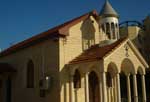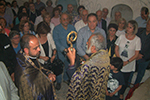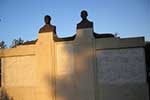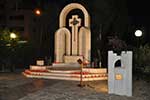Η Στήλη του Σασσουνιαν

Who Won Akhtamar Propaganda War: Armenians or Turks?
The Turkish government failed to attract the expected crowd of thousands of worshippers from around the world to the first Mass in almost a century, held at the Holy Cross Church in Akhtamar Island, on Sept. 19. Only a few hundred Armenians showed up, mostly from Istanbul.
Turkey failed miserably in trying to deceive world opinion into believing that it is tolerant towards Armenians. Eventually, it became obvious that Turkish leaders were more interested in putting on a political show than allowing a religious ceremony in a thousand-year old Armenian house of worship.
I wrote a column three years ago criticizing the Turkish government for converting the Holy Cross Church into a state museum. At the time, I urged Turkish officials to 1) place a cross on the church's dome; 2) designate it as a church rather than a museum, and allow regular celebration of Divine Liturgy; and 3) revert ownership of the church to the Armenian Patriarchate of Istanbul instead of placing it under the Turkish Ministry of Culture and Tourism.
Earlier this year, the Turkish government promised to place a cross on the dome of the church and allow services to be performed there on Sept. 19. I urged Armenians not to participate, knowing that Turkish officials' true intent was to stage a political show under the guise of religious ceremonies.
An intense debate ensued among Armenians on whether to boycott or attend the church services. Articles exposing the Turkey's sinister plans did little to settle the controversy. Making matters worse, the Holy See of Etchmiadzin and the Armenian Patriarchate of Jerusalem announced plans to send representatives to the Akhtamar church, although the Catholicosate of Cilicia declined to participate.
Finally, a lucky break! The Turkish government came to the rescue. A few weeks before the scheduled ceremony, a Turkish official announced that it would not be possible to place the promised cross atop the church, making the ridiculous excuse of "technical difficulties."
Prime Minister Erdogan was caught in a dilemma. Had he allowed the cross to be placed on the dome, he would have scored points with world public opinion, but would have lost crucial votes in the hotly-contested Sept. 12 referendum on constitutional reforms.
The cross finally saved the day! The Holy See of Etchmiadzin canceled its plans to send representatives to Akhtamar. The Armenian Patriarchate of Jerusalem did likewise. Tour operators called off their arrangements to take large numbers of Armenian worshippers to Lake Van. As a result, Turkey lost the propaganda campaign and considerable income.
In a last ditch effort to increase attendance, a few days before Sept. 19, Prime Minister Erdogan's office sent invitations to the Armenia media, offering all expense paid visits to Akhtamar, including free round-trip airfare, hotel accommodations and meals. Another fifty Armenian commentators and analysts received similar invitations, all of whom refused to go because of Turkey's refusal to install the cross.
Inadvertently, the Turks forced most Armenians to do the right thing and cancel their visits to the Holy Cross Church. Interestingly, the Turkish government behaved similarly when it declined to ratify the Armenia-Turkey Protocols, thereby safeguarding Armenia's interests.
While the Armenian public, civic groups, and some political parties opposed the Turkish plans at Akhtamar, the Armenian government remained remarkably silent. For unknown reasons, Turkey did not invite Armenian officials to the Holy Cross ceremonies. In view of the embarrassing games Ankara played with the Armenia-Turkey Protocols and the subsequent collapse of soccer diplomacy, it appears that Armenia's leaders were not too eager to join Turks in yet another ploy.
Regrettably, Armenians wasted far too much time and energy arguing with each other about going to Akhtamar. This distraction prevented them from organizing protests in major capitals to inform the world about the long history of Turkish atrocities, destruction of thousands of churches, and occupation of historic Armenian lands.
However, the boycott of the ceremonies because of the missing cross caught the attention of the international media. Ironically, Turkish officials helped further undermine their own cause, by placing the cross on the ground next to the Holy Cross Church, in full view of the public and TV cameras.
The Turkish government has now promised to place the cross atop the church in six weeks. Regardless of what Turkey decides to do with the cross, Armenians should pursue their own course of action, rather than simply react to the petty games of Turkish officials.
At this point, the only announcement Armenians are interested in hearing from Ankara is the return of the Holy Cross Church to the Armenian Patriarchate of Turkey.
By Harut Sassounian
Publisher, The California Courier




















